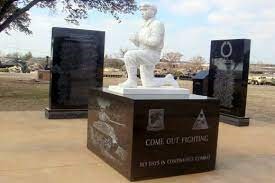

On July 6, 1944, one of the 761st’s few black officers, Lieutenant Jackie Robinson, was riding a civilian bus from Camp Hood to the nearby town of Belton. He refused to move to the back of the bus when told to do so by the driver. Court-martial charges ensued but could not proceed because the battalion commander, Lt. Col. Paul L. Bates, would not consent to the charges. The top brass at Camp Hood then transferred Robinson to the 758th Tank Battalion, whose commander immediately signed the court-martial consent.
The lieutenant’s trial opened on August 2 and lasted for 17 days, during which time the 761st departed Camp Hood. Robinson was charged with violating the 63rd and 64th Articles of War. The first charge specified, ‘Lieutenant Robinson behaved with disrespect toward Captain Gerald M. Bear, Corps Military Police, by contemptuously bowing to him and giving several sloppy salutes while repeating, O’kay Sir, O’kay Sir, in an insolent, impertinent and rude manner.’ The second charge stipulated, ‘Lieutenant Robinson having received a lawful command by Captain Bear to remain in a receiving room at the MP station disobeyed such order.’ Robinson was eventually acquitted, and he was not charged for his actions on the bus. Three years later, Robinson was riding buses in the major leagues after breaking baseball’s color barrier.
The men of the 761st trained for almost two years, conscious of the fact that white units were being sent overseas after as little as two or three months.

Finally, as the 761st was about to enter combat, Gen. George S. Patton (pictured above) reviewed the battalion and made a speech to the men, offering a guarded vote of confidence in their abilities:
“Men, you’re the first Negro tankers to ever fight in the American Army. I would never have asked for you if you weren’t good. I have nothing but the best in my Army. I don’t care what color you are as long as you go up there and kill those Kraut sons of bitches. Everyone has their eyes on you and is expecting great things from you. Most of all your race is looking forward to you. Don’t let them down and damn you, don’t let me down!’
Patton, who routinely referred to black soldiers as “niggers,” rotated his white combat troops every week or two after fighting on the front – but the 761st served for more than six months with the same personnel, sustaining a 50 percent casualty rate.
It was the 800-man 761st that liberated the Buchenwald and Dachau Nazi-run Jewish death camps. It took a 1985 letter to The New York Times by a liberated prisoner to bring this to light – the U.S. Army forgot to remember.
“The recollections are still vivid – black soldiers of the Third Army, tall and strong, crying like babies, carrying the emaciated bodies of the liberated prisoners,” wrote Benjamen Bender, a Buchenwald survivor.
Another Holocaust survivor, David Yeager of Poland, said of the 761st, “I thought they had come down from heaven.”
A monument dedicated to the 761st Tank Battalion was unveiled at Fort Hood, Texas during a ceremony attended by surviving veterans on November 10, 2005, as a permanent tribute to soldiers who have served and continue to serve throughout the world for liberty, honor and democracy. The monument features four black granite tablets surrounding a life-size marble sculpture of a 761st Tank Battalion fighter kneeling atop a black granite pedestal engraved with a tank on the front and a panther on the back.
The monument is located on 761st Tank Battalion Drive.
In 2009, Pete Chapmon released a documentary about the Black Panthers of the 761.

